
18 Jun Arizona attorney explains how states fight opioid epidemic with legal action

This still image from a 2015 video presented as evidence by the U.S. Attorney’s Office in federal court in Boston on Wednesday, Feb. 13, 2019, shows a scene from a rap video made to motivate Insys Therapeutics sales representatives to get doctors to prescribe higher doses of the company’s highly addictive fentanyl spray. (Insys Therapeutics/U.S. Attorney’s Office via AP)
PHOENIX — An expert with the Arizona Attorney General’s Office says legal action against drug manufacturers is making headway in the fight against the opioid epidemic.
One of the companies wrapped up in the epidemic is Chandler-based drug manufacturer Insys, which created and sold a fentanyl drug called Subsys used to treat pain.
“Just last week, Insys admitted in a Department of Justice settlement that they bribed doctors in order to sell more Subsys,” Matthew du Mee, chief counsel of the Consumer Litigation Unit, told KTAR News 92.3 FM’s Bruce St. James & Pamela Hughes Show on Tuesday.
“They sold almost $1 billion of this fentanyl drug in part by bribing doctors and paying them write prescriptions to patients, and patients had no idea what was happening.”
Fentanyl is a synthetic opioid that is 80 to 100 times stronger than morphine, according to the U.S. Drug Enforcement Association.
Du Mee said while the drug was at first used mostly for terminal cancer patients, the company’s “consumer fraud” led to more patients using it.
“I don’t think anyone can put their finger on the tipping point, but I think what we’ve seen is that gradually over time, it was a …misinformation campaign to slowly change the perception of opioids,” he said.
“And that was misinformation to doctors, misinformation to patients, just over time purveying this message that these things are safe, that there’s no harmful side effects, that they’re better than a lot of other drugs.”
Du Mee said Insys was largely motivated by profit when making these decisions.
“It’s very profitable to take a drug that was probably a million-dollar drug and turn it into a billion-dollar drug,” he said.
“Now (Insys stock is) approaching zero as the company’s declared bankruptcy, in part because people discovered what was going on and states brought lawsuits against them … and there’s also been federal criminal convictions of the executives.”
The Arizona Attorney General’s Office has also gone up against Purdue Pharma, the manufacturer of narcotic OxyContin.
The office entered a consent judgment with the company in 2007, forcing it to more accurately market the product, including disclosing its risk of dependence.
Now, du Mee said Purdue has violated that judgment and is facing a new lawsuit.
“One of the ways that they did this and provided this unbalanced information was by paying millions of dollars to seemingly independent nonprofits to promote prescription opioids, including OxyContin,” he said.
Du Mee said that although states are coming together and launching investigations, there is more to be done.
The attorney general’s office has given out $400,000 in grants to combat youth opioid use, helped train professionals to use overdose reversal drug Narcan and prosecuted doctors and pharmacists in opioid-related cases.
“I think that lawsuits are a part of the solution but there are a lot of other pieces,” he said.
“We’ve got to have people in the community speaking out and helping each other as well.”
Du Mee said anyone who feels they have been “injured” by opioid manufacturers or any other company through consumer fraud can file a consumer complaint.
Tune in to KTAR News 92.3 FM’s Bruce St. James & Pamela Hughes Show each day this week at 10 a.m. for special coverage of Arizona’s opioid epidemic.
To reach the Arizona Opioid Assistance and Referral Line, call 1-888-688-4222, or visit the website for more information.
[ad_2]
Source link



No Comments